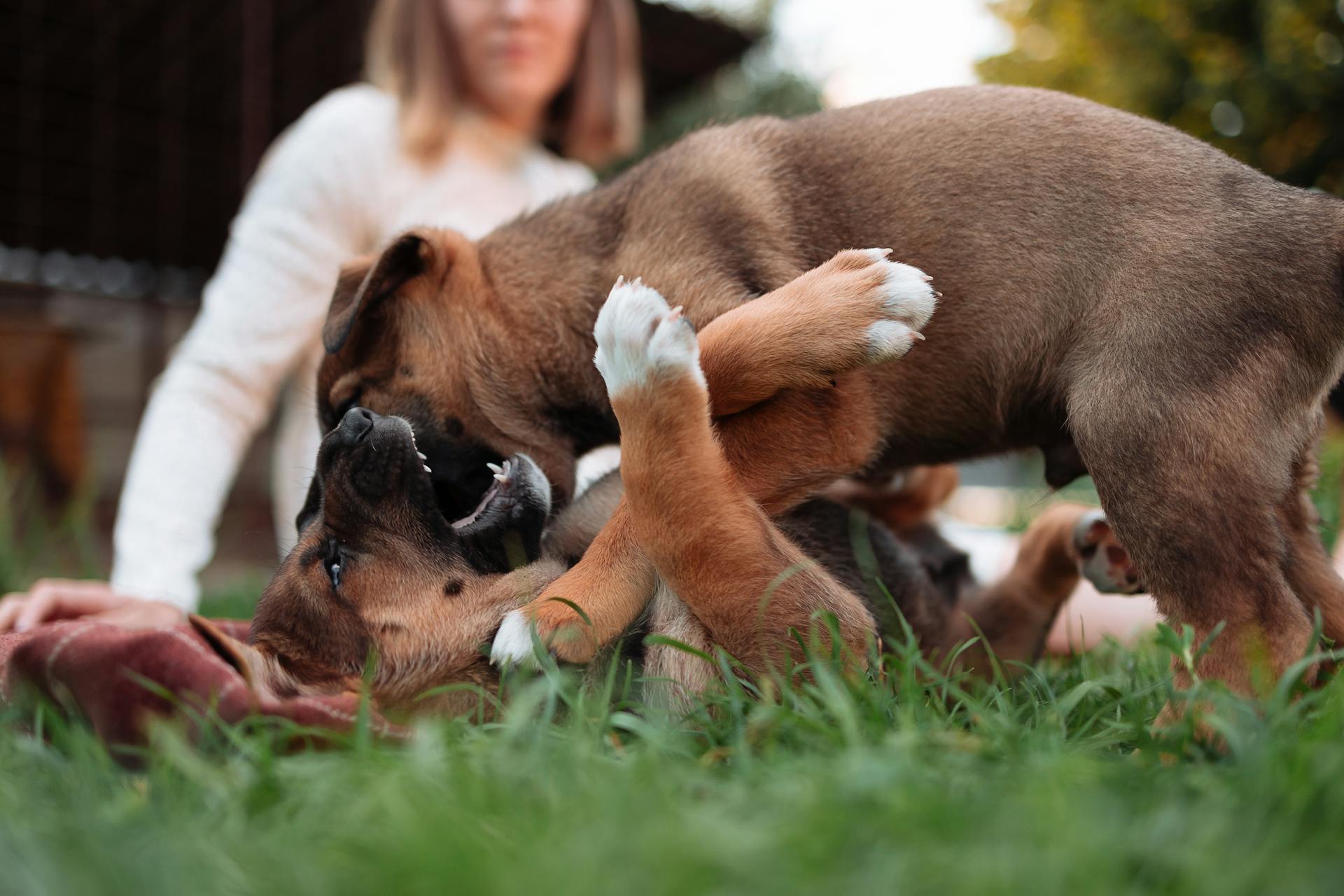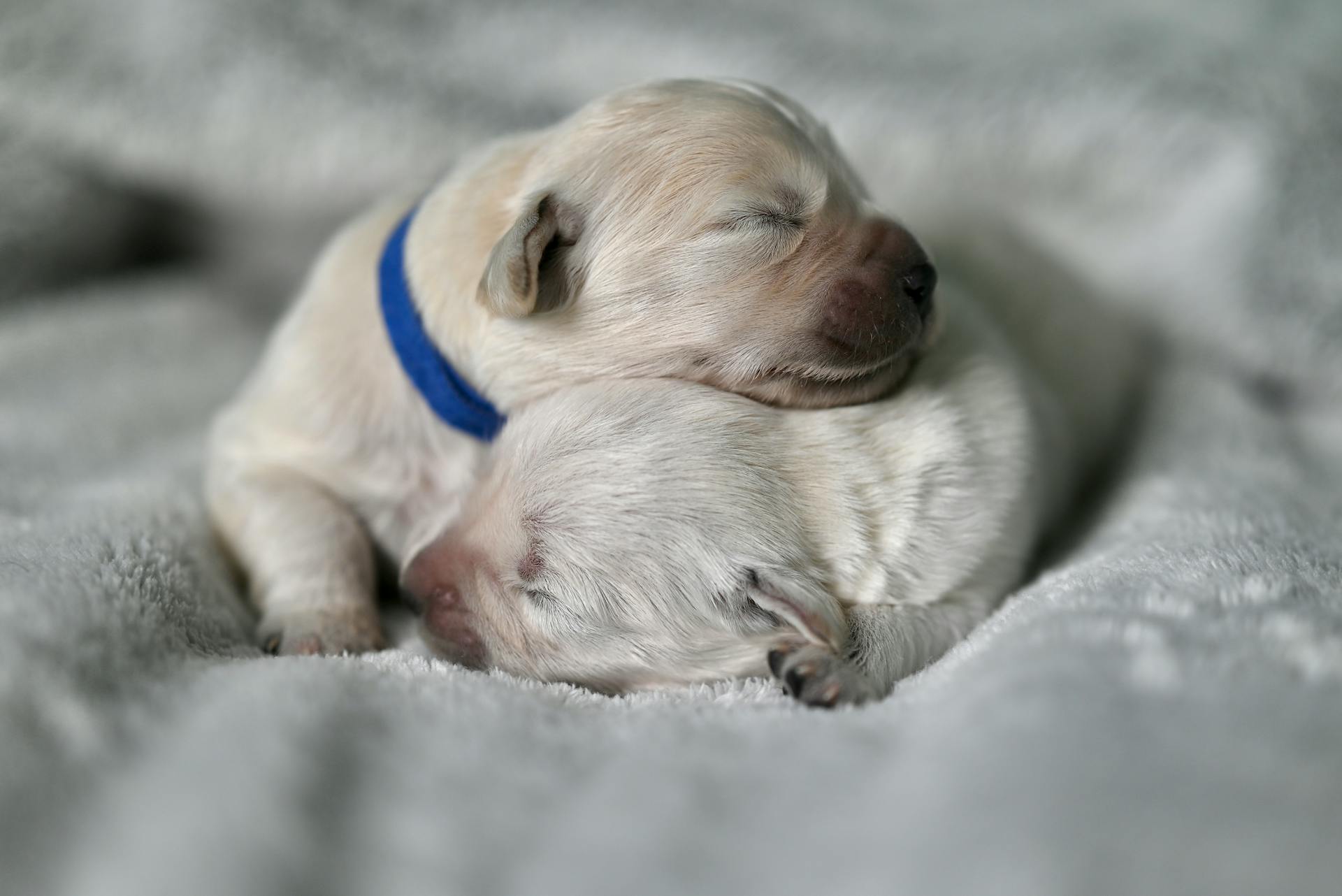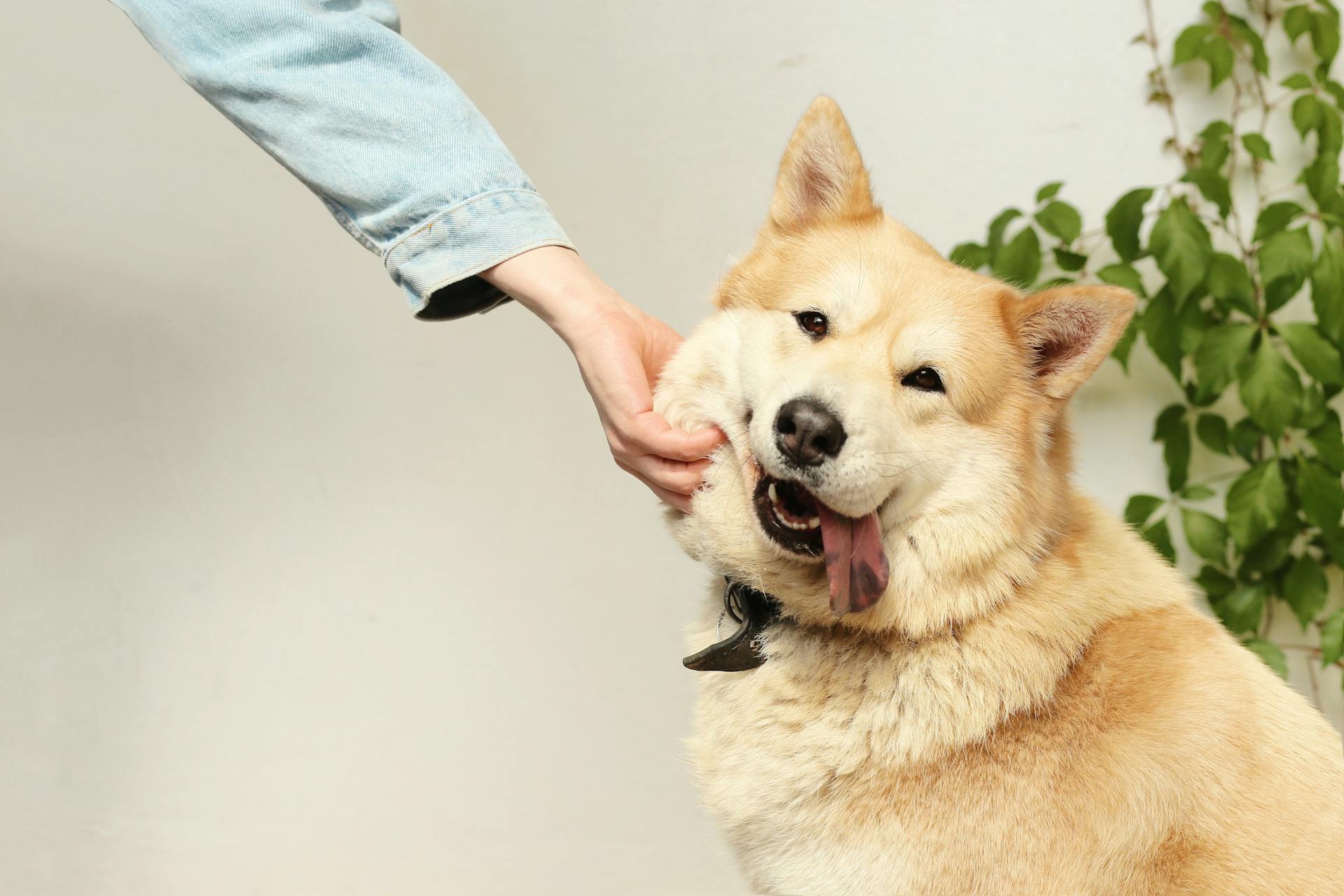
The F1b Bernedoodle is a popular crossbreed that combines the intelligence and loyalty of a Bernese Mountain Dog with the playfulness and energy of a Poodle. They're generally medium to large in size, weighing between 50-90 pounds and standing between 18-24 inches tall.
F1b Bernedoodles are known for their low-shedding coat, which requires regular grooming to prevent matting and tangling. This is especially important for their curly or wavy coats, which can be prone to knotting if not properly cared for.
Their friendly and outgoing personalities make them a great fit for families with children or for people who want a companion dog that's easy to get along with. With proper training and socialization, F1b Bernedoodles can thrive in a variety of living situations, from apartments to homes with yards.
For more insights, see: Bernedoodles and Goldendoodles
Care and Nutrition
Bernedoodles come in three sizes: Standard, Miniature, and Toy, each with its own unique care requirements. A Standard Bernedoodle can weigh 61-100 pounds and live 12-15 years, while a Toy Bernedoodle weighs less than 20 pounds and can live up to 18 years.
For your interest: Teacup Mini Bernedoodle Full Grown
To ensure your Bernedoodle gets a complete and balanced diet, feed them a dog food approved by the Association of American Feed Control Officials (AAFCO). This will provide your dog with the necessary nutrients for optimal health.
The feeding schedule for Bernedoodles varies depending on their age and size. Bernedoodle puppies should eat three to four meals a day, while adult Bernedoodles should eat two meals per day. A slow feeder can help prevent your Bernedoodle from scarfing down their meal too quickly.
Here's a quick guide to Bernedoodle sizes and their corresponding feeding needs:
Some Bernedoodles may benefit from joint supplements to prevent hip and elbow dysplasia, but it's essential to consult with your vet before adding any supplements to your dog's diet.
Care and Nutrition
F1B Bernedoodles require regular exercise to stay happy and healthy, just like any other dog. Aim for at least 30 minutes of playtime or walks each day.
Their coat needs to be brushed several times a week to prevent matting and tangling. This will also help reduce shedding.
As a "Doodle" dog, F1B Bernedoodles are often prone to health issues inherited from their parent breeds. Regular veterinary check-ups are essential to monitor their health.
A balanced diet that includes nutrient-rich foods is crucial for maintaining their overall health. Look for dog food that is high in protein and low in fillers.
F1B Bernedoodles are intelligent and trainable, but they can be stubborn at times. Consistent training and positive reinforcement are key to developing good behavior.
Their low-shedding coat requires less grooming than other breeds, but regular nail trimming, ear cleaning, and dental care are still necessary.
Check this out: Mini Bernedoodle Health Issues
Pet Care Considerations
A Standard Bernedoodle might prefer more space to stretch their legs and spread out when sleeping on the floor.
To determine the ideal lifestyle needs for your Bernedoodle, consider their size and energy level. Toy and Miniature Bernedoodles can live happily in a small apartment, while a Standard Bernedoodle might require more space.
Suggestion: Bernedoodle Standard
Bernedoodles are adaptable dogs and can fit into most families with proper exercise and care. Plan on at least two walks a day to keep your Bernedoodle active, healthy, and entertained.
These dogs also need lots of mental stimulation in the form of games, snuffle mats, and puzzle toys. A well-exercised Bernedoodle can happily fit into most families.
Here are some key considerations for pet parents:
Bernedoodles are generally good with children and other pets when properly socialized and raised in a loving and positive environment.
Care and Nutrition
When it comes to caring for your F1B Bernedoodle, regular veterinary care is crucial for maintaining its health and well-being. Routine check-ups, vaccinations, and parasite prevention are essential expenses to factor into your budget.
You can expect to pay between $100 and $300 for initial veterinary care, and between $30 and $70 per month for ongoing veterinary expenses.
A high-quality diet is also vital for your F1B Bernedoodle's health. The cost of food and treats can range from $50 to $100 initially, and between $60 and $120 per month.
Suggestion: Bernedoodle Care

Grooming is another essential aspect of caring for your F1B Bernedoodle, with costs ranging from $30 to $60 initially, and between $50 to $100 per month for professional grooming and tools.
Here's a breakdown of the estimated annual costs for veterinary care, food and treats, and grooming:
By understanding these costs, you can plan and budget accordingly to ensure your F1B Bernedoodle receives the best care possible.
Colors
Bernedoodles come in a wide range of colors and patterns, making each one unique. From tri-color to black and white, the possibilities are endless.
One of the most striking features of F1b Bernedoodles is their coat, which can be black, brown, or white. Some Bernedoodles even have a tri-color pattern, blending chocolatey, snowy, and ebony tones.
The specific color and pattern of a Bernedoodle can vary widely, even within the same litter. This means that every Bernedoodle is a one-of-a-kind.
Some common colors and patterns in Bernedoodles include tricolor, apricot, cream, black, and black and white. You might also see sable, sable and white, or phantom patterns.
Explore further: Bernedoodle Tricolor
Here are some common Bernedoodle colors and patterns:
- Tricolor: black, rust or tan, and white markings
- Apricot
- Cream
- Black
- Black and white
- Sable: shades of brown, sometimes with white markings
- Phantom: markings on the eyebrows, muzzle, throat, chest, legs, and paws in a contrasting color
These colors and patterns are just a few examples of the many possibilities in Bernedoodles.
Health and Wellness
F1B Bernedoodles are generally healthy dogs, thanks to careful breeding practices that aim to minimize genetic health issues. They can live for 12 to 16 years, depending on factors like genetics, diet, exercise, and preventive care.
Hip dysplasia and elbow dysplasia are common health concerns in F1B Bernedoodles, inherited from their parent breeds. Regular veterinary check-ups and maintaining a healthy weight can help prevent these issues.
A balanced diet enriched with omega-3 fatty acids is essential for the health and luster of their coat. Foods rich in these nutrients can help keep their fur soft and reduce skin irritation.
Some common health conditions in F1B Bernedoodles include hip and elbow dysplasia, progressive retinal atrophy, gastric torsion, heart conditions, cancer, skin allergies, ear infections, autoimmune disorders, and hypothyroidism.
Here are some key health considerations for F1B Bernedoodles:
- Hip and elbow dysplasia
- Progressive retinal atrophy
- Gastric torsion
- Heart conditions
- Cancer
- Skin allergies
- Ear infections
- Autoimmune disorders
- Hypothyroidism
Health Concerns

As a responsible Bernedoodle owner, it's essential to be aware of the potential health concerns that come with this breed. Bernedoodles can inherit conditions from their parent breeds, the Bernese Mountain Dog and the Poodle, which can affect their lifespan and overall health.
The average lifespan of a Bernedoodle is 12-18 years, depending on their size, with smaller dogs living longer than larger dogs. Regular veterinary check-ups, a balanced diet, and adequate exercise are key to maintaining their health.
Some common health conditions that can impact Bernedoodles include hip dysplasia, elbow dysplasia, Progressive Retinal Atrophy (PRA), and gastric torsion (bloat). These conditions can be inherited from their parent breeds and can lead to pain, arthritis, blindness, and even life-threatening complications.
Here are some specific health concerns to be aware of:
Genetic testing can help reduce the risk of these health concerns, and responsible breeding practices can also minimize the likelihood of inherited conditions. By staying informed and proactive, you can help ensure your Bernedoodle lives a happy and healthy life.
Standard

Standard Bernedoodles can grow up to 2.5 feet tall and weigh over 100 pounds. Their size can range from 45-115 pounds, making them a significant addition to any family.
Their height at the shoulder typically falls between 23-29 inches, which is a good indicator of their adult weight. A breeder with experience can usually estimate their adult weight within a 10-20 pound range.
Standard Bernedoodles have a tendency to vary in size due to the vast size range of standard poodles. It's not uncommon for them to weigh as little as 45 pounds, but this is less common.
Their size and weight can make them a great fit for families who have the space and resources to care for a larger dog. With proper exercise and care, Standard Bernedoodles can thrive in a variety of living environments.
Here's a rough estimate of the weight and height of Standard Bernedoodles:
Behavior and Training
Bernedoodles are known for their goofy, playful, and gentle nature, making them a joy to be around. They are highly intelligent and love to please their owners, which makes training a breeze.
With a good breeder and early training, your Bernedoodle will grow into a sweet and happy dog. They are quick to learn basic cues, fun tricks, and essentials like crate training and potty training.
To train your Bernedoodle effectively, use positive reinforcement like treats, praise, and play. This approach not only motivates them but also fosters a positive association with training.
Here are some key training aspects to focus on:
Consistency and patience are key when training your Bernedoodle, as they can be sensitive and require gentle guidance.
Training Needs
Training needs for F1B Bernedoodles are relatively straightforward, thanks to their high intelligence and trainability. They thrive on mental and physical stimulation, making regular exercise and training sessions a must.
Their high intelligence means they can pick up commands quickly, but consistency and positive reinforcement are key. With patience and persistence, they'll learn to obey commands and even perform tricks.
One thing to keep in mind is their tendency to be a bit stubborn at times, a trait inherited from the Bernese Mountain Dog side. Early socialization and training can help mitigate this, making them more responsive to commands.
A unique perspective: Bernedoodle Potty Training
Here are some key training tips for F1B Bernedoodles:
- Use positive reinforcement techniques, such as treats and praise, to encourage good behavior.
- Be consistent in your commands and expectations to avoid confusing them.
- Provide regular exercise and mental stimulation to keep them happy and engaged.
- Start training early, ideally from 8 weeks old, to help them develop good habits.
Overall, with the right approach and a bit of patience, F1B Bernedoodles can learn to be well-behaved and loving companions.
Male vs Female Differences
Male F1B Bernedoodles are often larger and may exhibit more dominant behaviors, while females might be more independent and reserved.
Males tend to be more playful and outgoing, while females can be more cautious in new situations.
In terms of size, males are generally larger, while females usually mature faster, both physically and mentally.
Here are some key differences between male and female F1B Bernedoodles:
It's essential to be aware of the potential health concerns that may be more prevalent in one gender than the other, such as hip dysplasia in males or reproductive health concerns in females.
A unique perspective: Bernedoodle Health Issues
Racing
Racing is a high-energy activity that requires focus and precision. Horses can reach speeds of up to 45 miles per hour.
To excel in a racing competition, a horse's speed and agility are crucial, but so is its endurance. A horse's average stride length is 6-8 feet, which helps it maintain a steady pace.
Racing can be mentally taxing for horses, which is why proper training and conditioning are essential. Studies have shown that horses that are well-trained and conditioned can perform better under pressure.
A well-trained horse can learn to respond quickly to commands, which is vital in a racing competition.
Frequently Asked Questions
How much does a F1b Bernedoodle cost?
A F1b Bernedoodle's price typically ranges from $1,500 to $3,000, depending on factors like breeder reputation and bloodline. Adoption fees can be significantly lower, around $500.
How big will a F1B Bernedoodle get?
A F1B Bernedoodle typically weighs between 50-80 pounds and stands 23-29 inches tall at the shoulder. Their size can vary, but they generally fall within the smaller to medium standard range.
Is F1 or F1B Bernedoodle better?
For those with severe allergies, the F1B Bernedoodle is a better choice due to its non-shedding coat. However, F1 Bernedoodles may still be a great option for those with mild allergies or a preference for a more varied coat.
What is a standard F1B Bernedoodle?
A standard F1B Bernedoodle is a backcross between a Poodle and an F1 Bernedoodle, resulting in a 75% Poodle and 25% Bernese Mountain Dog mix. This unique blend creates a low-shedding, intelligent, and affectionate companion.
What is the most desirable Bernedoodle?
The most desirable Bernedoodle is the Tri-Color Bernedoodle, known for its classic color and pattern. This unique look is highly sought after, but also the hardest to produce.
Sources
- https://www.petmd.com/dog/breeds/bernedoodle
- https://centralillinoisdoodles.com/f1b-bernedoodle-puppies/
- https://chocolatelabdenver.com/blogs/dog-breeds/f1b-bernedoodle
- https://happyoodles.com/2023/09/f1b-bernedoodle/
- https://www.bluegrassbernedoodles.com/post/temperament-coat-size-color-everything-you-need-to-know-about-bernedoodles
Featured Images: pexels.com


